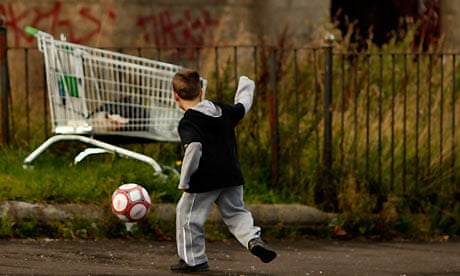The following correction was printed in the Guardian's Corrections and clarifications column, Friday 26 March 2010
This article about a book entitled Britain's War on Poverty quoted its author, the US academic Jane Waldfogel, as saying that relative poverty had risen in Britain. Professor Waldfogel would like to make clear that this is the case only in the past five years and that relative poverty is still lower than it was a decade ago, which is why the British record compares favourably with that of Europe as well as the US
Britain's "war on poverty" has been one of the government's success stories, eclipsing the achievements of the United States and European neighbours, according to a year-long study by a US academic.
Despite claims that Britain is "broken", a book released today in New York highlights that by most measures things have improved for more than a decade.
Jane Waldfogel, professor of social work at Columbia University, spent a year examining Labour's record and found it had turned the tide of child poverty in a way that was "larger and more sustained than in the United States". Her book, Britain's War on Poverty, shows that the number of children in "absolute poverty" had fallen by 1.7 million since 1999. Latest figures show 13.4% of British children remained in "absolute poverty" whereas in the US the figure was approaching 20%.
Prof Waldfogel, who spent the last year at the London School of Economics, said she was bemused by the political debate over "broken Britain". She said: "It's just not right. Progress in the United States stalled in 2000 and then child poverty rises again. The gloom and doom about the state of children and families in Britain is not justified by the data."
Relative poverty, says Waldfogel, has risen but this is due to the wealthiest in society seeing incomes balloon – leaving the rest behind. However, redistribution had provided real benefits for the poor.
Sustaining government spending would be difficult in the recession, she admitted, but the solution was to shift the burden by increasing the minimum wage or lengthening working hours.
In international terms, Britain's ranking of "wellbeing of young people" also improved: compared with other rich nations, this measure saw the UK move up from 17th place in 2001 to 12th in 2006.
Britain's story on child poverty is also better than many in Europe. While the UK child poverty rate fell, "[it] was rising or constant" on the continent. "Denmark, which had the lowest child poverty rate in the group in 1995, at 6%, saw its rate rise to 10% by 2006."
Waldfogel's work shows a change in behaviour for the poorest people in Britain, with families at the bottom of society increasing the amount spent on children's items and reducing their expenditure on alcohol and tobacco.
"In contrast, there were no statistically significant changes in expenditures on learning and enrichment activities or child care in the United States," she wrote. In short, British reforms have allowed "low-income families to catch up with more advantaged families in terms of their expenditures on child-focused learning and enrichment items".

Comments (…)
Sign in or create your Guardian account to join the discussion